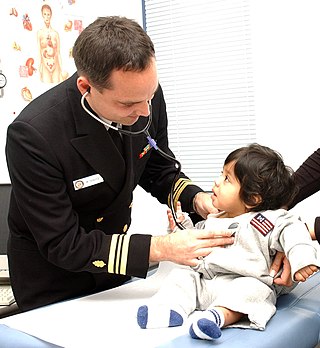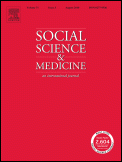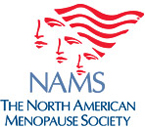
Menopause, also known as the climacteric, is the time when menstrual periods permanently stop, marking the end of reproduction. It typically occurs between the ages of 45 and 55, although the exact timing can vary. Menopause is usually a natural change. It can occur earlier in those who smoke tobacco. Other causes include surgery that removes both ovaries or some types of chemotherapy. At the physiological level, menopause happens because of a decrease in the ovaries' production of the hormones estrogen and progesterone. While typically not needed, a diagnosis of menopause can be confirmed by measuring hormone levels in the blood or urine. Menopause is the opposite of menarche, the time when a girl's periods start.
Medical anthropology studies "human health and disease, health care systems, and biocultural adaptation". It views humans from multidimensional and ecological perspectives. It is one of the most highly developed areas of anthropology and applied anthropology, and is a subfield of social and cultural anthropology that examines the ways in which culture and society are organized around or influenced by issues of health, health care and related issues.
Behavioral medicine is concerned with the integration of knowledge in the biological, behavioral, psychological, and social sciences relevant to health and illness. These sciences include epidemiology, anthropology, sociology, psychology, physiology, pharmacology, nutrition, neuroanatomy, endocrinology, and immunology. The term is often used interchangeably, but incorrectly, with health psychology. The practice of behavioral medicine encompasses health psychology, but also includes applied psychophysiological therapies such as biofeedback, hypnosis, and bio-behavioral therapy of physical disorders, aspects of occupational therapy, rehabilitation medicine, and physiatry, as well as preventive medicine. In contrast, health psychology represents a stronger emphasis specifically on psychology's role in both behavioral medicine and behavioral health.
Hypoestrogenism, or estrogen deficiency, refers to a lower than normal level of estrogen. It is an umbrella term used to describe estrogen deficiency in various conditions. Estrogen deficiency is also associated with an increased risk of cardiovascular disease, and has been linked to diseases like urinary tract infections and osteoporosis.
Nursing credentials and certifications are the various credentials and certifications that a person must have to practice nursing legally. Nurses' postnominal letters reflect their credentials—that is, their achievements in nursing education, licensure, certification, and fellowship. The letters usually appear in the following order:

A family nurse practitioner (FNP) provides continuing and comprehensive healthcare for the individual and family across all ages, genders, diseases, and body systems. Primary care emphasizes the holistic nature of health and it is based on knowledge of the patient in the context of the family and the community, emphasizing disease prevention and health promotion.
The American Society for Bone and Mineral Research (ASBMR) is a professional, scientific and medical society established in 1977 to promote excellence in bone and mineral research and to facilitate the translation of that research into clinical practice. The ASBMR has a membership of nearly 4,000 physicians, basic research scientists, and clinical investigators from around the world.

Social Science & Medicine is a peer-reviewed academic journal covering social science research on health, including anthropology, economics, geography, psychology, social epidemiology, social policy, sociology, medicine and health care practice, policy, and organization. It was established in 1967 and is published by Elsevier.

The International Association for Physicians in Aesthetic Medicine (IAPAM) is a voluntary association founded to unite licensed physicians who practice aesthetic medicine, by assisting in their professional and personal development.
The European Academy of Occupational Health Psychology (EA-OHP) is a pan-European organization that was established in 1999. Along with the International Commission on Occupational Health's scientific committee on Work Organisation and Psychosocial Factors, EA-OHP is one of the first organizations of its kind to be devoted to occupational health psychology (OHP).

JoAnn Elisabeth Manson is an American physician and professor known for her pioneering research, public leadership, and advocacy in the fields of epidemiology and women's health.
The Biofeedback Certification International Alliance (BCIA) is an organization that issues certificates for biofeedback, which is "gaining awareness of biological processes".
The European Menopause and Andropause Society is an institution that promotes the study, and encourages research of midlife health. Founded in 1998.
The Journal of Child Psychology and Psychiatry is a peer-reviewed scientific journal covering both child and adolescent psychology and psychiatry providing an interdisciplinary perspective to the multidisciplinary field of child and adolescent mental health, though publication of high-quality empirical research, clinically-relevant studies and highly cited research reviews and practitioner review articles.
Human services is an interdisciplinary field of study with the objective of meeting human needs through an applied knowledge base, focusing on prevention as well as remediation of problems, and maintaining a commitment to improving the overall quality of life of service populations. The process involves the study of social technologies, service technologies, and scientific innovations designed to ameliorate problems and enhance the quality of life of individuals, families and communities to improve the delivery of service with better coordination, accessibility and accountability. The mission of human services is to promote a practice that involves simultaneously working at all levels of society in the process of promoting the autonomy of individuals or groups, making informal or formal human services systems more efficient and effective, and advocating for positive social change within society.
Certified anesthesiologist assistants (CAAs) are highly trained master’s degree level non-physician anesthesia care providers. CAAs are integral members of the anesthesia care team as described by the American Society of Anesthesiologists (ASA). This designation must be disambiguated from the Certified Clinical Anesthesia Assistant (CCAA) designation conferred by the Canadian Society of Respiratory Therapists. All CAAs possess a baccalaureate degree, and complete an intensive didactic and clinical program at a postgraduate level. CAAs are trained in the delivery and maintenance of all types of anesthesia care as well as advanced patient monitoring techniques. The goal of CAA education is to guide the transformation of student applicants into competent clinicians.

Wulf H. Utian is a physician, reproductive endocrinologist, clinical researcher, and academic women's health department administrator. He is best known for first recognizing menopause as a potential health-related issue. He is the co-founder of the International Menopause Society and founder of the North American Menopause Society. Previously he has worked as a medical department Director at the Mount Sinai Medical Center, the University Hospitals of Cleveland, and academic chairman of the department of Reproductive Biology at Case Western Reserve University School of Medicine. He is currently the Arthur H. Bill Professor Emeritus of Reproductive Biology at the Case Western Reserve University School of Medicine, a consultant in women's health, and Scientific Director Emeritus of Rapid Medical Research Inc.
Credentialing is the process of establishing the qualifications of licensed medical professionals and assessing their background and legitimacy.

Gillian Alexandra Hawker is a Canadian clinician-scientist. She is a Professor of Medicine at the University of Toronto and Sir John and Lady Eaton Professor and Chair of Medicine at Women's College Hospital. Hawker's research focuses on causes and treatments for osteoarthritis.
Mercy Amua-Quarshie is a Ghanaian obstetrician-gynecologist in Dallas, Texas. She earned the Berlex Labs award for best OBGYN teaching resident while completing her OBGYN residency at Boston Medical Center/Boston University.







